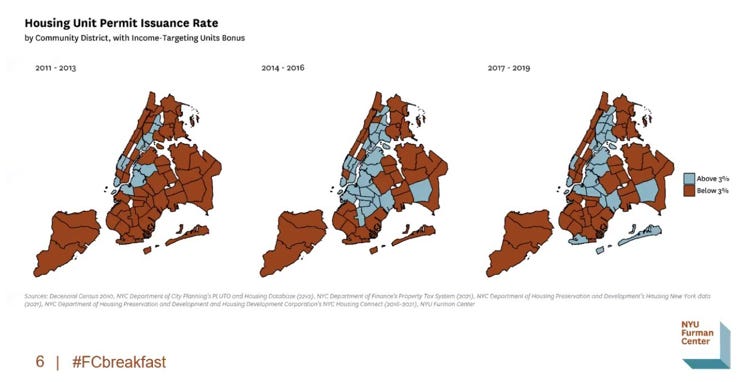FAQs for Gov. Hochul’s new housing plan
Some more granular information on the housing plan and how it applies to NYC.
If you are not up to speed with the Housing Compact, or the set of policies Governor Hochul hopes to employ to reach her 800,000 unit milestone, then click here for a summary. This article will expand on Hochul’s policy announcements and dive a bit deeper into the strengths, weaknesses of the plan and how it might apply to New York City. This is a summary of the February 9th Policy breakfast at the Furman Center, NYU, which covered the topic.
DHCR Commissioner RuthAnne Visnauskas framed the breakfast discussion by saying some of the below:
Unlike common perceptions held by tenants, displacement due to new residential developments is low.
What is also small is the impact on median homes values that new mixed income developments have in communities.
Visnauskas also highlighted that building more housing has the effect of slowing the rate of rental increases, or stabilizing it (i.e., one of the core mission statements of DHCR).
Visnauskas underscored the lag between jobs created and new homes built in the last decade.
QUESTIONS FROM THE BREAKFAST
What policies would have the most impact?
The 3% mandate for all 59 community boards in NYC.
The transit-oriented development (TOD).

What does NYC have to do to make the Housing Compact work within the five boroughs?
The way to make the Housing compact work for the city’s goal of 800K units by 2032, is to meet the 3% mandate. Each of the 59 community boards in NYC will need to grow their housing stock by 3% every 3 years. If this is not met, then local boards will get “fast tracked” and projects that are sent for appeal to the new NY state “appeals office” will swiftly get approved.
What is missing from Hochul’s plan?
Clear enforcement mechanisms for the housing compact.
Specifics around loosening environmental reviews for projects.
New tax incentives.
How do we make sure that housing that gets built includes affordable housing in higher income areas?
Use tax breaks to incentivize those doing the work. Example: Provide FAR / density bonuses for affordable housing properties. This will enable development to pencil out.
How might enforcement for the Housing Compact work?
Right to private action - empower non-profits to sue if housing is not built.
Impost steep penalties to deter foul play.
Whatever the mechanism used, keep it simple.
How do you respond to calls for Good Cause eviction to be shelved due to its implied increasing capital costs, uncertainty of implementation and regulatory pressures?
There are extreme versions of the law, either too restrictive or not restrictive enough, that will make this fail. We just need to pin down the right formula that works for most parties. Other states are managing Good Cause policies without issue.
Housing units are being added in NJ and CT in excess of job. Shouldn't we try to harness that via interstate housing compact?
Yes.
Do we think NYC can contribute 400,000 more units in the next 10 years without a tax abatement?
No.



